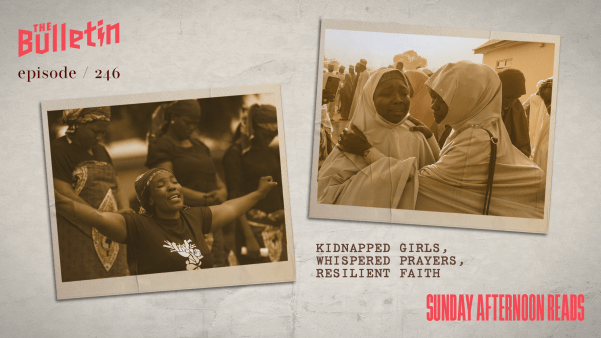Sometimes in church history, we find lightning in a bottle, moments so powerful that we wonder whether they could be the norm rather than the exception. The Barmen Declaration is one of those moments. Authored by an ecumenical group of Lutheran, Reformed, and United Church theologians and pastors, this 1934 document offered a clarion call from the Confessing Church. When much of the church capitulated to Adolf Hitler, Barmen warned of the dangers he posed to the church and the world. The declaration glows in historical remembrance, and rightly so.
Do we need another such declaration now? I see the question asked more and more in the American church in recent years, particularly among educated evangelicals. Church attendance has declined, church scandals have proliferated, and in many Christian circles worry is running high around the new Trump administration and its handling of immigration, religious advocacy, rule of law, and humanitarian programs and policies.
So is it time for evangelicals to write a new statement of principles? I welcome the instinct to try to stand for truth—yet would offer a word of caution.
We should start by asking what the original Barmen Declaration meant in its time and what something similar might mean today. As an appeal to Protestant congregations across Germany, the document emphasized the threat of “alien principles” being forced on the German church by the Nazi government. It named numerous threats, some of which would be just as familiar to Christians today (like nationalism and government promises of safety), but others of which are less germane to an American context (like government interference in church confessions).
Chief among those threats was the way in which the government was exercising dominion over the church’s ability to be the church. During the first year of the Nazi regime, a new movement formed of “German Christians,” represented by a national bishop and organized significantly around loyalty to Hitler. The Barmen Declaration responded to that movement, but the document also contradicted those who wished to carve a “third way,” affirming both Jesus Christ and fidelity to the government.
There were many challenges yet to come for German Christians that were not fully in view in 1934. Repudiation of the extermination of God’s covenant people, the Jews, is notably absent from the document. But it does respond to pressing concerns, including Hitler’s claim to determine how churches should proclaim the gospel, the assumption that one can read God’s will in a cultural trend like National Socialism, and the notion that the church should be subject to the state.
The declaration was the fork from which ran two Protestant trajectories in Germany: the German Evangelical Church, which acquiesced to Hitler’s party, and the Confessing Church, which did not. After the document’s release, the Confessing Church began to organize, establishing a new seminary and new parishes with ministers willing to say no to Hitler.
Authored by some of the leading figures within European Christianity, Barmen remains a shining light in Christian history and our collective imagination. Yet its reach was objectively limited.
Intended not as a confession of faith but as a declaration, the document could never do the work of ordinary church formation, nor was it intended to fill that role. Its framers hoped to rouse a slumbering church to see impending danger, but their statement never had the authority of local church discipline.
The declaration also suffered from the swift institutional decline of the Confessing Church. By 1937, internal divisions had caused the Evangelical Lutheran Church to break away from the movement. By 1940, many Confessing Church leaders had been arrested. By 1949, it had disbanded entirely. Along the way—as we read in the letters of Dietrich Bonhoeffer and others—issues of finances, church support, and legal restrictions by the Nazi government hastened the Confessing Church’s demise. (If you cannot drown a movement’s passion, smothering it with paperwork may do just as well.)
So how would a comparable declaration fare today? American Christians have a long history of authoring statements in times of emergency, sometimes with explicit allusion to Barmen as a model.
Consider the Christians Against Christian Nationalism statement, aimed at raising awareness of efforts to “merge Christian and American identities,” or the recent statement by the Southern Baptist Ethics and Religious Liberty Commission on supporting Israel. Authored in response to particular political events, these documents seek to bring awareness to specific problems by way of theological categories.
The most recent major statement came in 2024. Written “in this moment of social conflict and political division,” it traces mostly uncontroversial theological truths (allegiance to Jesus Christ, the truth of the Scriptures, the image of God) and outlines how Christians should live amid division (refrain from fear, value each life, judge leaders by their character). This statement and others like it largely follow Barmen. But Barmen and these more recent confessions diverge in three important ways.
First, Barmen focuses primarily on clarifying theological principles. Across its elements, it articulates one theological point: Jesus Christ is Lord, and the state is not. It offers no practical guidance on what to do next and so, though occasioned by Nazi overreach, can be applicable for Christians in many different contexts.
Contemporary statements, by contrast, tend to dwell on practical recommendations that tie them to a particular time, place, and political context. In the 2024 statement, for example, “this moment of political division” determines what confessions are included. Practical recommendations like “We will lead with love not fear” exist alongside theological affirmations of Scripture’s authority, the imago Dei, and the need for godly character in leaders.
Second, the Barmen Declaration was designed to work through institutions committed to its theological vision. It was in synods, church councils, committee meetings, and classrooms that the Confessing Church teased out the practical implications of Barmen. Modern evangelical statements typically do not likewise rely on thick institutions to shape, sustain, and flesh out their truths.
The 2024 statement, authored primarily by university officials, is signed by a variety of people but is without a readily available context for implementing these ideas. The signers rely instead on goodwill, individual liberty, publicity, and free association—all good but ultimately flimsier things. It’s notable that all who signed did so “in their personal capacity,” as the 2024 statement announces, making it an affirmation of goodwill, but not one with institutional backing.
Third, the Barmen Declaration had a smaller and better-defined audience. It was written, pre-internet, by and for church leaders. It was read and had influence in institutional settings.
Today, open letters and signed declarations proliferate online. They are signed by people with a more limited scope of authority and less (or sometimes no) institutional accountability. They are public and compete for attention in the rapid stream of public discourse—“now … this,” as Neil Postman called it. Accordingly, modern statements—even if written in the tongues of angels—stand little chance of gaining traction. Their medium works against their message.
These differences reveal the very limited utility of yet another statement. They show the difference between what the Barmen Declaration meant in its era and what a new declaration would mean today.
That’s not to say the church doesn’t face great challenges in our moment. And there are many government policies—including, recently, challenges to churches’ tax-exempt status , religious education requirements as defined by government officials, the closure of pathways of refugee resettlement, and overreach into the lives of churches by the executive branch—that are worth our opposition.
But we should be realistic about what we can accomplish with a post on the internet in 2025. In the American evangelical context, another online declaration is dead on arrival.
Making something like Barmen stick requires more than good writing and impressive signatories. It requires a laser-like focus on the theological convictions at stake and an interconnected institutional and ecclesial life capable of enforcing those convictions in budgets, in curricular decisions, and in pastoral training programs.
American evangelicalism in 2025 is equipped to write and theologize, to reason about the contradictions between the life of the world and the life of God’s kingdom. But our institutions, ecclesial authority, and networks are everywhere fragile, if not in decline.
What is left for us is not despair but retrieval. We must begin with commitment to rebuild institutions from the local church upward. Rightly remembering Barmen helps us see that its theological vision—while clear and provocative—was paired with a sober recognition that change does not come by declaration alone. Without an entire network of institutional support and dedicated local discipleship, Barmen would have been nothing but a clanging cymbal.
American evangelicals need that same solid foundation of institutions and discipleship. Declarations can meaningfully speak truth to power only if they come from a community that does more than speak—a community that faithfully prays and doggedly works for the world the declaration demands. Now is the time for rebuilding churches capable of welcoming strangers, feeding the hungry, and proclaiming the gospel. But the way there is slow, and there are no shortcuts, no matter how clarion the call to arms.
Myles Werntz is author of From Isolation to Community: A Renewed Vision for Christian Life Together. He writes at Taking Off and Landing and teaches at Abilene Christian University.




















